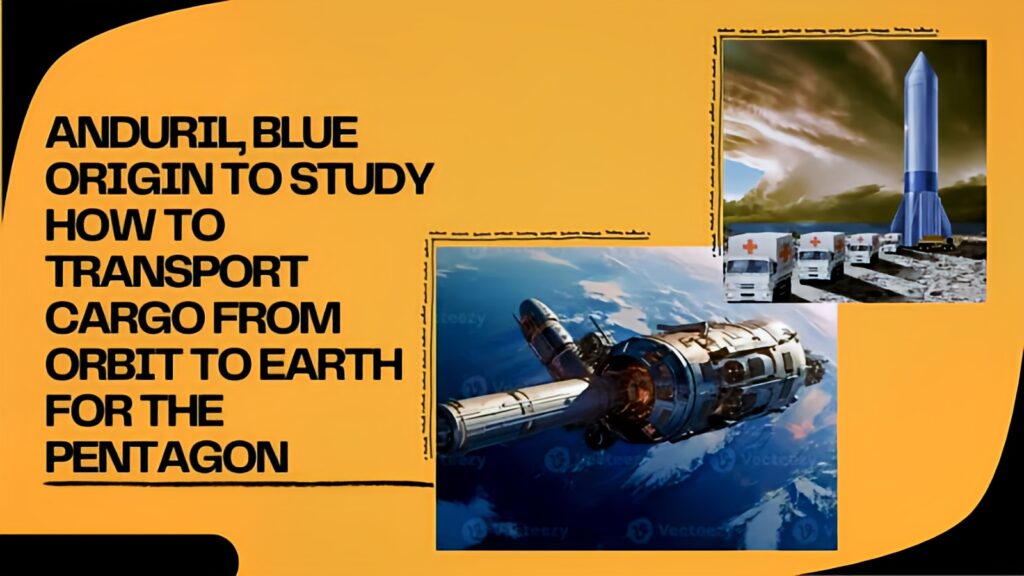The U.S. Air Force has awarded study contracts to Blue Origin and defense startup Anduril to assess how rockets and reentry systems could be used for rapid global cargo delivery. . Air Force study contracts aimed at exploring how commercial space technology could reshape the Pentagon’s approach to global cargo transport. Air Force contracts to study how commercial rocket and reentry technology could transform global military cargo transport.. Air Force contracts to study how reusable rockets and space technology could transform global military cargo transport. Air Force contracts to study how commercial space technology could transform global military cargo transport. Air Force study contracts to examine how commercial rockets and reentry systems could transform military cargo transport. Awarded under the Rocket Experimentation for Global Agile Logistics program, the contracts—$1.37 million for Blue Origin and $1 million for Anduril—signal early steps toward “delivery as a service,” enabling the Pentagon to move supplies rapidly to remote or contested regions.The relatively small awards — $1.37 million for Blue Origin and $1 million for Anduril — are part of the Air Force Research Laboratory’s (AFRL) Rocket Experimentation for Global Agile Logistics (REGAL) program. Though modest in size, these study contracts are seen as significant first steps toward an ambitious vision: using reusable rockets and reentry systems to transport massive loads of military cargo across the globe in under an hour. The Rocket Cargo initiative reflects the Pentagon’s interest in procuring “delivery as a service,” similar to the way it contracts with commercial airlines. By leveraging private-sector innovation, the Air Force hopes to develop capabilities to rapidly supply remote, contested, or disaster-stricken areas.REGAL serves as the experimentation arm of the Air Force’s broader Rocket Cargo program, tasked with testing commercial rockets, reentry vehicles, and cargo transport systems that could one day support rapid military operations around the globe. Blue Origin’s award focuses on analyzing how its technology, including the in-development heavy-lift New Glenn rocket, could support “point-to-point material transportation.” The company will conduct its work from Merritt Island, ..Blue Origin will carry out its contract work from Merritt Island, Florida, its home on the Space Coast and the development site of its heavy-lift New Glenn rocket. While Blue Origin has kept a low profile on defense work, the new contract highlights the Air Force’s interest in leveraging the company’s massive reusable rocket platform. reusable New Glenn rocket platform for potential military logistics. Anduril’s contract is perhaps more surprising. Best known for AI-powered defense systems, drones, and border surveillance towers, the California-based company appears to be branching into an entirely new business line: spacecraft reentry systems. Under its REGAL contract, Anduril will study how to develop a payload container capable of carrying between 5 to 10 tons of cargo back to Earth. The system would need to integrate with multiple government-defined payloads, survive atmospheric reentry, and safely deliver contents intact — a notoriously difficult engineering challenge. Currently, only a handful of companies can reliably return payloads from orbit. SpaceX’s Dragon capsule is the most prominent, ferrying astronauts and supplies to and from the International Space Station. Varda Space Industries has also been developing reentry capsules designed for in-space manufacturing. If Anduril can design a versatile, military-grade reentry container, it would position the company as a unique supplier in an area with very limited competition. These new awards build on a REGAL contract granted earlier this year to Rocket Lab, which, unlike the Blue Origin and Anduril studies, notably included a flight demonstration component. While the Air Force has not revealed detailed timelines or specific milestones for these studies, the incremental contracts suggest a step-by-step approach toward proving whether commercial rocket systems can be adapted for rapid, global military logistics. timelines, the growing roster of companies signals a widening pool of contenders for larger-dollar contracts down the line. The long-term vision for Rocket Cargo is bold. Beyond moving heavy cargo across continents in minutes, AFRL has suggested the program could eventually enable point-to-point transportation of personnel. For the Pentagon, the ability to bypass traditional airfields and deliver directly into remote theaters could provide a decisive logistical advantage in future conflicts or humanitarian crises. For now, the Blue Origin and Anduril awards remain exploratory. But they mark another step toward a future where military cargo — and perhaps even soldiers — could ride commercial rockets as easily as passengers boarding an airplane today.
Anduril, Blue Origin to study how to transport cargo from orbit to earth for the Pentagon
Facebook
Linkedin
Twitter
Pinterest
WhatsApp

Related Article





